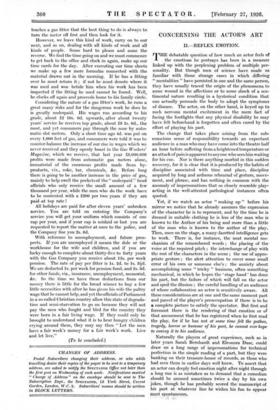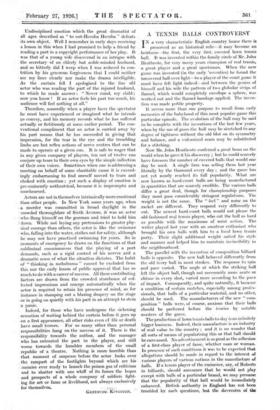CONCERNING THE ACTOR'S ART
II.—REFLEX EMOTION.
rfHE debatable question of how much an actor feels of the emotions he portrays has been in a measure linked up with the perplexing problem of multiple per- sonality. But though men of science have made us familiar with those strange cases in which differing " mentalities " have persisted in one and the same person, they have usually traced the origin of the phenomena to some wound in the affections or to some shock of a sen- timental nature resulting in a hysterical condition that can actually persuade the body to adopt the symptoms of disease. The actor, on the other hand, is keyed up to such nervous mental excitement in the mere fact of facing the footlights that any physical disability he may have felt beforehand is forgotten and often cured by the effort of playing his part.
The change that takes place arising from the sub- conscious sense of responsibility towards an expectant audience in a man who may have come into the theatre half an hour before suffering from a heightened temperature or an attack of pain is apparent to anyone who sees him waiting for his cue. Nor is there anything morbid in this sudden recovery, for it is clear that it is produced by the habits of discipline associated with time and place, discipline acquired by long and arduous rehearsal of gesture, move- ment, and phrase, and has nothing in common with the anomaly of impersonations that so closely resemble play- acting in the well-attested pathological instances often quoted.
Yet, if we watch an actor " making up " before his mirror we notice that he already assumes the expression of the character he is to represent, and by the time he is dressed in suitable clothing he is less- of the man who is known to the Author of his being and more than a little of the man who is known to the author of the play. Then, once on the stage, a many-facetted-intelligence gets to work. • There is, for instance, the neat mental me- chanism of the remembered words ; the placing of the voice at the required pitch ; the interchange of play with the rest of the characters in the scene ; the use of appro- priate gesture ; the alert attention to cover some small error of his own or someone else's ; the anxiety about accomplishing some " tricky " business, often something mechanical, in which he hopes the ' stage hand' has done his part, but the failure of which will fall on the actor and spoil the illusion.; the careful handling of an audience of whose collaboration an actor is sensitively aware. All these considerations are at one and the same moment part and parcel of the player's preoccupation if there is to be a complete picture to satisfy the spectator. But first and foremost there is the rendering of that emotion or of that amusement that he has registered when he first read the play, for if he has not at some time felt the pathos, tragedy, horror or humour 'of his part, he cannot ever hope to convey it to his audience. - Naturally the players of great experience, such as in later years Sarah Bernhardt and Eleonora Duse, could draw on a long range of impersonations for technical _ perfection in the simple. reading of a part, but they were baiiking on their treasure-house of records, as those who had seen them in earlier days well knew. To assert that an actor can deeply feel emotion night after night through a long run is as mistaken as to demand that a comedian should be amused sometimes twice a day by his own 'jokes, though he 'has probably scored the manuscript of his part at whatever line he wishes his fun to appear most spontaneous. Undisciplined emotion which the great dramatist of all ages described as " to out-Hecuba Hecuba " defeats its own object. Well I remember in early days receiving a lesson in this when I had promised to help a friend by reading a part in a copyright performance of her play. It was that of a young wife discovered in an intrigue with . the -secretary- of an .elderly but noble-minded husband, and so bitterly did I weep when I was reduced to con- trition by his generous forgiveness that I could neither see my lines. clearly nor make the drama intelligible. As the curtain fell I apologized to the fine old -actor who was reading the part of the injured husband, to which he made answer : " Never mind, my child ; now you know ! If an actor feels his part too much, his audience will feel nothing at all."
Therefore, assuredly when a player faces the spectator he must have experienced or imagined what he intends to convey, and his memory records what he has suffered actually or fictitiously at some earlier period. The con- ventional compliment that an actor is carried away by his part means that he has succeeded in giving that impression, for the tear in the eye and the trembling limbs are but reflex actions of nerve centres that can be made to operate at a given cue. It is safe to wager that in any given company of players, ten out of twelve can conjure up tears to their own eyes by the simple inflection- ' of their own voices. Sometimes when one is addressing a meeting on behalf of some charitable cause it is exceed- ingly embarrassing to find oneself moved to tears and choked with emotion ; yet such a display of emotion is pre-eminently untheatrical, because it is impromptu and unrehearsed.
Actors are not in themselves intrinsically more emotional than other people. In New York some years ago, when -a murder was committed in broad daylight in the crowded thoroughfare of Sixth Avenue, it was an actor who himself on the gunman and tried to hold him down. While not laying any pretensions to greater phy- sical courage than others, the actor is like the swimmer who, falling into •the water, strikes out for safety, although he may not have practised swimming for years. So in moments of emergency he draws on the functions of that subliminal -consciousness that the playing of a part demands, such as a rigid control of his nerves and a dramatic sense of what the situation dictates. The habit of " thinking in melodrama " cannot be excluded from this nor the early lesson of public approval that has so much to do with a career of success. All these contributing factors are drawn from the crowded- storehouse of col- lected impressions and emerge automatically when the actor is required to retain his presence of mind, as for instance in stamping out a blazing drapery on the stage • or in going on quietly with his part in an attempt to stem a panic.
• Indeed, for those- who have undergone the sickening sensation of waiting behind the curtain before it goes up on a first appearance, all other risks even of life or death have small terrors. For so many other. than personal responsibilities hang on the success of it. There is the responsibility towards the author, and the manager who has entrusted the part to the player, and still worse towards the humbler members of the small republic of a theatre. Nothing is more horrible than that moment of suspense before the actor looks over . the rampart of the footlights beyond which are his enemies ever ready to launch the poison gas of criticism and to shatter with one whiff of its fumes the hopes and prospects of a whole company of soldiers fight- ing for art or fame or livelihood, not always exclusively for themselves.
GERTRUDE KINGSTON.























































 Previous page
Previous page